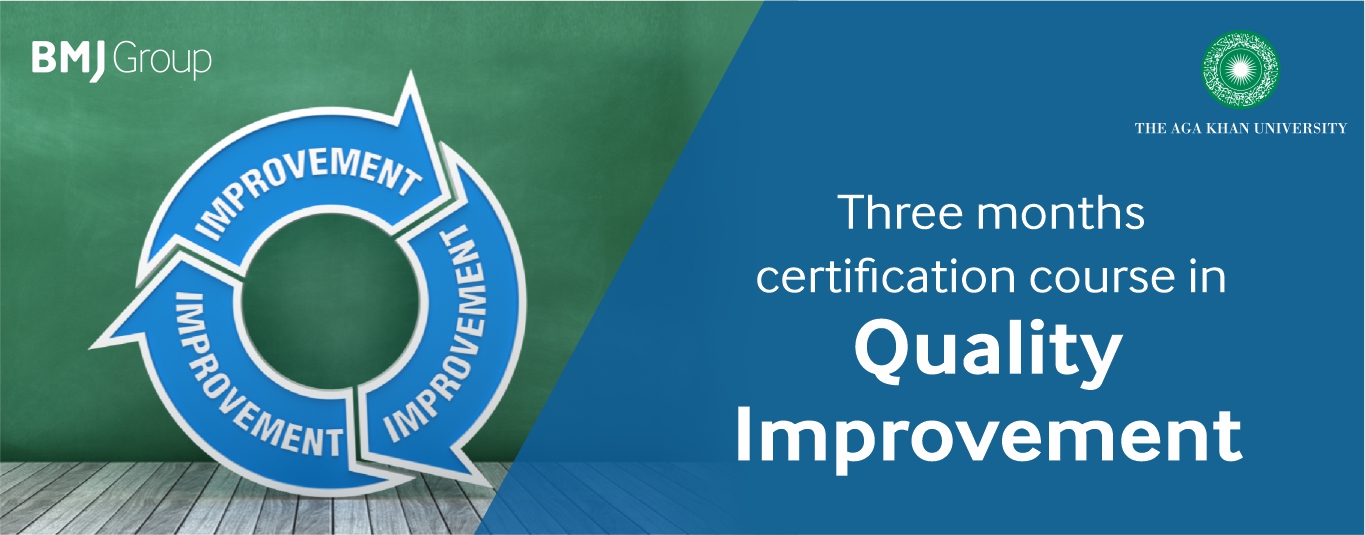
Curriculum
| Three months Certificate Course in Quality Improvement | Curriculum | |
Fees
| PKR 95000 (inclusive of tax) |
Apply Now |
|
Course Directors

Dr Asad Latif
Course Director, AKU
Dr. Asad Latif is currently serving as the Chair of the Department of Anesthesiology at the Aga Khan University, Karachi. A graduate of the Aga Khan University Medical College, he did an internship in General Surgery before completing a residency in Anesthesiology from the State University of New York at Downstate, Brooklyn, New York in 2007. He followed with a fellowship in Adult Critical Care Medicine from Johns Hopkins University School of Medicine, Baltimore, Maryland, and was subsequently selected to become a faculty member there in 2008. Dr. Latif went on to obtain an MPH from the Johns Hopkins Bloomberg School of Public Health in 2012, focusing on health systems and global health. As core faculty at the Armstrong Institute for Patient Safety and Quality, he was involved in projects to improve patient safety and quality of care across the world. He was recruited to return to the Aga Khan University in 2019.
Much of Dr. Latif's academics are focused on patient safety and quality improvement during perioperative, acute, and critical care across a variety of healthcare settings, particularly resource-poor environments. He helped start the Centre for Patient Safety in 2020 and is also currently leading the Pakistan Tele-ICU project, aimed at improving the national capacity to care for critically ill adult, pediatric and, neonatal patients through infrastructure assessment, training, and remote peer-to-peer consultation.

Dr. Kieran Walsh
Clinical Director, BMJ Learning & BMJ Best Practice
Dr Kieran Walsh is Clinical Director at BMJ. He is the clinical lead of the medical education and clinical decision support products at BMJ. He has a vast amount of experience in online medical education, clinical decision support, face to face delivery of medical education, and both summative and formative assessment. He has published over 200 papers in biomedical literature and has written four books: the first and only book on cost effectiveness in medical education; a dictionary of quotations in medical education; a history of medical education in 100 images; and the Oxford Textbook of Medical Education. He is a Fellow of the Higher Education Academy, a Fellow of the Royal College of Physicians of Ireland, a Fellow of the Academy of Medical Educators, and Adjunct Associate Professor at Monash University. In the past he has worked as a hospital doctor specialising in General Internal Medicine and Geriatric Medicine.

Dr Fozia Asif, MBBS, MBA, MHQS (Harvard)
Academic Director
Dr. Fozia Asif is a distinguished healthcare leader with an MBBS, MBA in Healthcare
Management, and a Master's in Healthcare Quality and Patient Safety from Harvard
University. She is currently the Associate Director at the Centre for Patient Safety at Aga Khan University. With over a decade of experience in patient safety, quality improvement, and healthcare management, Dr. Asif has been instrumental in developing patient safety
frameworks and leading academic programs. Her extensive research experience focuses on
healthcare quality and patient safety, particularly in low-resource settings, where she aims to
develop national estimates of adverse events and identify approaches to reduce patient harm. She has led several research projects and published widely on patient safety culture and adverse event reporting. Dr. Asif's expertise also includes international collaborations, guiding hospitals toward Joint Commission International Accreditation, and fostering a culture of patient safety through education and research. She is a sought-after speaker and remains actively involved in mentoring and curriculum development.
About this course
To charter a meaningful, prosperous career in the healthcare industry, an individual must be equipped with the skills and knowledge to improve the quality of healthcare. As someone who is tasked with providing hands-on care for patients, healthcare professionals who are also administrators should aim for strong positive impacts on patients' lives. These professionals must have a complete understanding of the issues that frequently arise and prevent quality care.1To cater to this important need for a credible e-learning course in quality improvement, BMJ, in partnership with Aga Khan University (AKU), Pakistan, is launching a three-month certification course in quality improvement. This course is an ideal starting point for healthcare workers interested in acquiring the knowledge and skills to lead patient safety and quality improvement in their institutions. The course modules emphasise practical applications in everyday practice, providing the tools and techniques to ensure successful implementation of improvement methodology. The learning assumes very little prior exposure to improvement methodology, principles, and tools.
As part of this program, there will be two additional virtual sessions conducted by AKU experts, offering deeper insights and guidance to further enhance participants' learning experience.
BMJ is one of the world's leading providers of medical knowledge and education, known for the quality of its content. Like our other credentialed courses, the content for this course is evidence-based and peer-reviewed.
About AKU
For over 30 years, The Aga Khan University has built a reputation in Pakistan for excellence in teaching and learning. The mission of AKU is to improve the quality of life in the developing world and beyond, through world-class teaching, research and health-care delivery. With programmes in educational development, medicine, nursing and midwifery, the university aims to inspire young researchers and professionals to become forces of positive change in their communities. The Aga Khan University's Medical College, has a proven track record of providing quality medical education. The Medical College places great emphasis on the professional, personal and intellectual development of students, so that its graduates become contributory members and leaders of society. The University's Postgraduate Medical Education strives to instill critical thinking and analysis into its graduates to promote evidence-based health care and research abiding by the principles of ethics and professionalism. Each programme is carefully structured to produce skilled healthcare professional and to facilitate a process of broad professional and personal development. The University educates students for local and global leadership, generates new knowledge to solve problems that affect millions of people, and raises standards and aspirations in the countries in which it works.About IHI
Integrated Human Initiatives, a company incorporated in Pakistan. Kupgrade is a Medical Education initiative of IHI, the registered entity. Kupgrade is the first dedicated Medical Education project within the scope in Pakistan. Our mission is "Knowledge Upgrade". We are proud to partner with the BMJ in Pakistan since 2017. This academic relationship helps us to provide the latest medical content to the Pakistani researchers and healthcare professionals in medical universities and healthcare organizations.Course Duration
3 MonthsAs part of this program, there will be two additional virtual sessions conducted by AKU experts, offering deeper insights and guidance to further enhance participants' learning experience.
Eligibility Criteria
This course is suitable for any graduate & health care professionals who are interested in acquiring knowledge and skills to lead patient safety and quality improvement in their day to day practice.Assessment criteria
Exam: Online exam as well as virtual viva by AKUFor successful completion of the course minimum passing percentage required is 70%.
To apply for the course, please click here
For more information, please write to us at education.pakistan@bmj.com or you can call us at Telephonic query please reach out to Ms. Sadia: 0092 3008202951 (09:30 AM - 05:00 PM, Monday to Friday).
Reference Source
https://onlinehealthsciences.duq.edu/blog/quality-improvement-in-healthcare/
Course objectives
- After completing this course, you should be able to:
- 1. Understand the key components of a successful and sustainable programme of change.
- 2. Know about quality improvement and its application for improvement to clinical care.
- 3. Know the importance of clinical leadership within the healthcare system
- 4. Understand the key concepts of measurement in QI projects and have a greater practical knowledge of data collection and analysis
- 5. Define patient safety and know the harm caused by errors and system failure.
- 6. Recognize the human factors and factors affecting error and human performances.
- 7. Understand your stakeholders and know why relations are important.
- 8. Understand the importance of a well designed intervention.
- 9. Understand the importance of a project management framework for QI projects.
- 10. Understand a system and its relation to healthcare and the difference between them.

